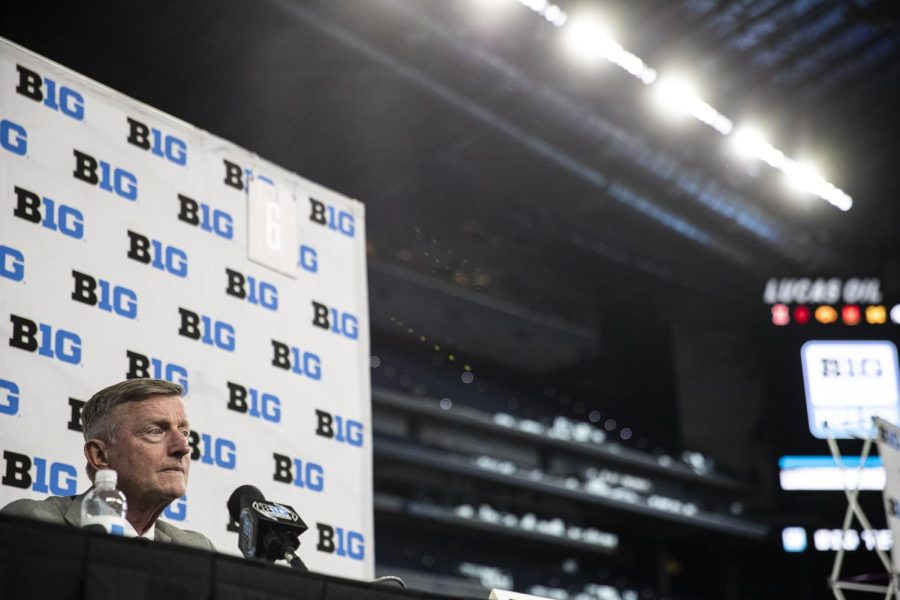Big Ten Coordinator of Football Officials discusses national official shortage in youth and high school sports
Bill Carollo, who was an NFL official for two decades, said angry parents who verbally and sometimes physically abuse referees and umpires play a large part in the shortage.
Big Ten coordinator of football officials Bill Carollo speaks with media during day one of Big Ten Media Days at Lucas Oil Stadium in Indianapolis, Ind., on Tuesday, July 26, 2022. The event marked the 50th annual Big Ten Media Days.
July 27, 2022
INDIANAPOLIS — Big Ten Coordinator of Football Officials Bill Carollo talked about the national official shortage in youth and high school sports on July 26 at Big Ten Football Media Days.
While Corollo said he has not experienced difficulty finding officials for Big Ten games, the 70-year-old who officiated in the NFL for 20 seasons, said official shortages in lower-level sports are a “severe problem.”
According to the New York Times, roughly 50,000 high school referees — 20 percent of all prep officials — quit between 2018 and 2021.
Carollo said parents of athletes who verbally and physically abuse officials are mostly to blame.
“There’s a big shortage of the pool people that going into [officiating]” Carollo said. “And the main reason is because of parents. Once in a while a coach or two, but parents on the sideline at youth sports go after … and we’ve had a lot of officials attacked, and it sounds real dangerous and it is at times and they’re out of control.”
RELATED: Iowa football head coach Kirk Ferentz weighs in on name, image, and likeness, NCAA transfer rules
According to a 2017 survey conducted by the National Association of Sports Officials, 87 percent of the roughly 17,000 officials who were surveyed said they suffered verbal abuse in their role as officials. Thirteen percent said they had been physically assaulted before, during, or after a game.
Carollo said two out of three officials quit after three years in the business.
“When someone starts officiating, it’s usually … after they get out of college, they last three years,” Carollo said. They quit because, you know the abuse that they have to take, and we don’t pay a lot of money at the lower levels … It’s too hard to get yelled at. You walk out on the field and you get booed before you make your first call.”
Carollo said the verbal and physical abuse directed toward officials stems from a problem in society. He said fans and parents want to “blame somebody” and that blame usually falls to officials.
“Everyone’s taking shots at everybody, complaining, they can sit in their basement on Twitter and complain and criticize people,” Carollo said. “They don’t have the guts to become an official, or become a coach, or become a player. You know, to go out there and embarrass … you dropped a touchdown pass. Well, it takes guts to go out there and play and find out how good you really are.
“In officiating is just like playing for us,” Carollo continued. “You get graded. My guys and gals they don’t like to get a report card on Wednesday morning, ‘These are the right calls. These are the wrong calls.’ So mentally they have to be tough, it’s a different breed of person.”
Carollo said in the past he has brought in a sports psychologist who helped LPGA Tour players to help his officials build confidence.
“You have to be fearless,” Carollo said of the mentality of an official. “You got to be mentally really tough, like a player. You fumble the ball, give it to me again, throw it to me again. Put my name on the line again. So we bring outside people in to talk to our guys … I want them to teach in a positive way … and we have had really good results of that.”



